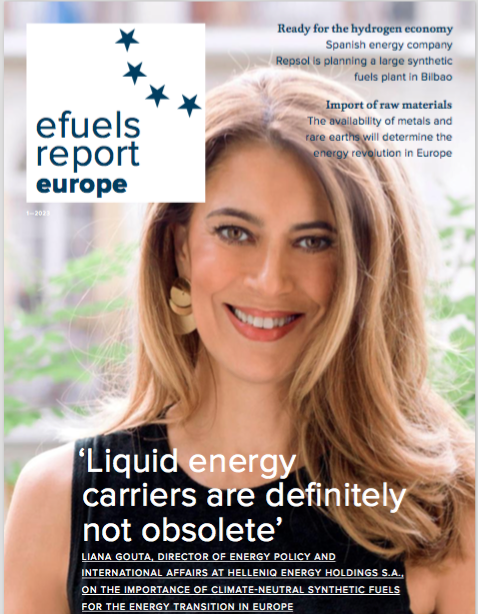Given their chance, efuels (synthetic fuels) could help us and the planet!!
Kim Henson writes:
The German fuelling association ‘UNITI’ has very recently presented the second edition of the European magazine “Efuels Report Europe”, and I have just studied in depth its 28 pages…
This comprehensive document sets out in detail, and in a balanced manner considering many aspects, the challenges facing the world (and especially Europe) in terms of the best/most helpful ways of reducing harmful emissions from vehicles of all types in order to meet the ‘climate change’ targets that will affect us all in the coming years, while continuing to keep people mobile.
Within its pages are honest and sometimes necessarily blunt descriptions of the various options available to governments and fuel supply industries, and it covers many aspects that are seldom considered in discussions on these subjects.
While acknowledging that electric vehicles certainly have their place (especially as many governments and vehicle manufacturers have already invested heavily in electromobility), the difficulties/drawbacks that can result from an over-dependence on electric power are also detailed. These include, as just one example, the ‘whole life’ environmental performance of electric vehicles (EVs) versus vehicles powered by internal combustion engines. It considers environmental/climate change factors and the use of rare/precious minerals that have to be mined and that are being used up in ever-increasing quantities, but which are required to construct EV batteries.
The subject of dependence on foreign countries for energy supplies/EV components/minerals required for EV batteries is also covered. Included too are warnings about the dominance of countries such as Russia for gas supplies (now greatly reduced in Germany, for example, as a result of the invasion of Ukraine by Russia) and the possibilities of future difficulties in a similar manner, in terms of the almost total dependence upon China (already!) for EV battery raw materials.
The argument is made that carbon-neutral efuels (synthetic fuels) can be used alongside vehicle electrification, to help the world arrive at ‘net zero’ more rapidly than by relying on electromobility alone. This approach would also avoid dependence on a single country for EV/battery materials, as mentioned above and which potentially could result in major problems in the future.
The point is also re-iterated that it is NOT internal combustion engines per se that produce harmful/environmentally-damaging emissions, but the fuels used within them. The use of carbon-neutral efuels would enable cars, vans, lorries, boats, ships and aircraft (as well as heating systems in buildings) to continue to be operated long into the future, using existing infrastructure in terms of liquid fuel storage, transportation and delivery via forecourts to drivers/operators. Liquid efuels can be used on a ‘drop-in’ basis to replace fossil-based types.
Regardless of whether or not the building of new internal combustion engine vehicles is to be banned from 2030, 2035 or any other date (depending on the country), there will be many millions of such vehicles operating for many years after the ‘cut-off date’. The report points out that some vehicle manufacturers are still developing, and plan to build, vehicles with such engines, and that these can be run on efuels in the same way as existing vehicles.
In this context the point is made that in many parts of the world (including, for example, Africa), there is currently virtually no infrastructure in place to enable electric vehicles to operate, and this will be the case for many decades.
It is interesting that the report also looks at hydrogen as a viable future fuel, and in addition notes that the Spanish energy company Repsol is planning to build a huge plant in Bilbao, to produce synthetic fuels.
I should also highlight the fact that within the pages of the report are detailed again the processes by which efuels (synthetic fuels) are produced. It underlines the fact that they are ‘carbon-neutral’ if renewable energy – such as wind and solar power – is used in their production. (Wheels-Alive has covered the basic steps required in previous features on this subject).
Essentially the materials needed are: Electricity from renewable sources, water to produce hydrogen through electrolysis, and CO2 from the atmosphere.
Such fuels are termed ‘synthetic’ as they involve synthesizing hydrogen and carbon.
CONCLUSIONS
I found this report, which is optimistic in outlook as interest in this subject grows, fascinating and to me it was heartening to read that efuels are now being taken more seriously in mainland Europe as a useful tool to help keep us mobile in the future.
It underlines the importance of looking at ‘the big picture’ rather than to focus JUST on electric vehicles, important though these are.
I should also mention that I have nothing against electric vehicles. Indeed I have driven a wide variety, and have been very impressed by the way in which many of them drive. (That said, ‘range anxiety’ is still ever-present in some models, and incomplete infrastructure for recharging remains a major issue for drivers, especially in the U.K. at present).
I recommend reading the whole of this report to appreciate its scope and depth of coverage, presented in an open-minded manner and considering so many valid points.
To read the full report, please go to: https://www.uniti.de/
and click on the report in English that opens from the first page.
FURTHER INFORMATION ON EFUELS, HOW THEY ARE PRODUCED AND POTENTIAL BENEFITS:
